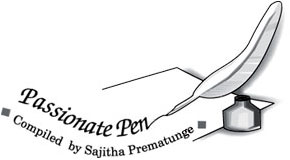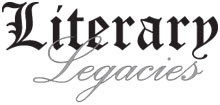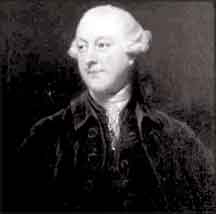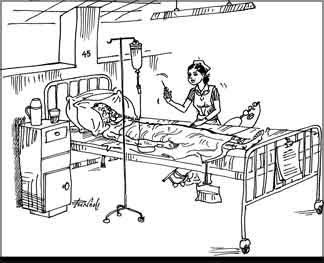
Marlowe and Raleigh:
Two sides of a shepherd’s love coin
By Carl MULLER
Telling of the poets between 1500 and 1620, I must first give you
some verses of a perfect lyric written by Christopher Marlowe:
The Passionate Shepherd to his Love
Come live with me and be my love,
And we will all the pleasure prove,
That valleys, groves, hills and fields,
Woods or steepy mountain yields.
And I will make thee beds of roses,
And a thousand fragrant posies,
A cap of flowers and a kirtle,
Embroider’d all with leaves and myrtle.
Another great poet, Sir Walter Raleigh, could not resist a reply to
this. He wrote an equally good lyric in reply that he titled, ‘The
Nymph’s Reply to the Shepherd.’
If all the world and love were young,
And truth in every shepherd’s tongue,
These pretty pleasures might we move,
To live with thee and be thy love.
Thy gowns, thy shoes, thy beds of roses,
Thy cap, thy kirtle, and thy posies,
Soon break, soon wither, soon forgotten,
In folly ripe, in season rotten.
Yes, Elizabethan England had become, as some said, “a temple of
poetry”. While keeping other greats for a future telling, let us look at
the Reformation. There was a great deal of dissatisfaction with the
corruption of the medieval church.
Chaucer wrote a satire on it and the English theologian John Wycliff
(his name has been spelt in many ways) sermonized against Papal
interference in secular matters. Wycliff was called the ‘Morning star of
the Reformation” and he inspired Martin Luther in Germany to raise his
own standard against the Vatican.
In England, it culminated with the declaration of Henry VIII to be
sole head of the English church. It was then that William Tyndale wrote
his new translation of the Bible.
As would be expected, the effects of the Reformation were, in one
way, disastrous. Abbeys and religious houses were suppressed. Whatever
their faults, they had been the only seats of learning.
Then came the destruction of books and even precious manuscripts were
being used by shop assistants as wrapping paper. Tons of precious
theological tomes were shipped out, and with them went many of the
treasures of early English Literature that disappeared forever.
However, all this havoc was a prelude to a richer life, especially
unequalled in the realm of Literature. Before the end of 1600, England
had produced many great writers. Prose was rich and varied and, besides
the Renaissance and Reformation, there also came a new spirit of English
nationality.
Fiction came to be the most original 16th century prose and the word
‘novel’ appeared in mid century. In 1579, John Lyly published ‘Euphues,
The Anatomy of Wit” and a year later, “Euphues and His England.” He
actually wanted to write a moral treatise and found that he had, quite
accidentally, invented the novel!
His style was called “a cunning courtship of fair words,” Later, ever
Shakespeare imitated Lyly’s style in some of his passages, but also
ridiculed it in others. There was Sir Philip Sidney who wrote a romance,
“Arcadia” that was full of fierce warfare and faithful lovers. It was
published four years after Sydney was killed in battle at Zutphen,
Holland. “Arcadia” has been called “a prose version of Edmund Spenser’s
“The Faerie Queene.”
Upon Sidney’s death the “Edinburgh Review” said: “Sidney was a
refinement upon nobility,” while David Hume called him “the most perfect
model of an accomplished gentleman,” and Spenser regarded him not only
as a flower of chivalry but “the most heroic spirit, the heaven’s pride,
the glory of our day.” You will find that all these qualities of Sidney
are reflected in his “Arcadia.”
New demands arose in English college and schools. Writers began to
mock at the Oxford Professors who never read; the way undergraduates
were insufficiently prepared; the schemes of student government for
schools, but praised the efforts to reform English spelling.
But many others hit back claiming that the schools were excellent and
that teachers wrote books that were beneficial to students as well as
their professional successors.
This was very true, for Roger Ascham wrote “Toxophilus” that urged
physical training for schoolboys, and “Schoolmaster” in which he hit out
at harsh punishments for slow but solid-minded boys; condemned travel
abroad for education that only corrupted students, and also said that to
imitate classical models was the only way to write in a good English
style.
Another teacher was tutor to Edmund Spenser, and in his writings
demanded that all men and women should be educated and also trained to
fit their stations in life. He was the first to call for training
schools.

Goldsmith - poet with a doctorate?
 Oliver Goldsmith was a poet, dramatist, and essayist and a son of an
Irish clergyman, born at Pallasmore in Co. Longfordborn, Ireland, in
1728. Oliver Goldsmith was a poet, dramatist, and essayist and a son of an
Irish clergyman, born at Pallasmore in Co. Longfordborn, Ireland, in
1728.
Soon after his birth his family moved to Kilkenny West, where Oliver
first went to school. At the age of nine he left the little school at
Kilkenny, and attended several academies. He received a B.A. degree in
February 1749 from Trinity College, Dublin.
After the death of his father, he went to live with his mother. When
he was twenty-four he was again endowed and went to Edinburgh to study
medicine, where for a year and a half he made some slight pretence at
attending lectures, and then went to Leyden, presumably to continue his
studies.
In 1756 he returned to England, without a penny in his pocket,
although he had, according to his own statement, received a doctor’s
degree. In London he turned his hand to every sort of work: translation,
the writing of superficial histories, children’s books, and general
articles. One of the works of this period which is still included in the
works is the enquiry into the state of polite learning in Europe.
Through the publication of The Bee and the Life of Beau Nash,
Goldsmith achieved considerable popularity, and his fortunes began to
mend. He belonged to the circle of Johnson, Burke, Reynolds, and was one
of “The Club.” The Traveller appeared in 1764, and his reputation as a
poet was firmly established.
The Vicar of Wakefield, published two years later, increased his
popularity, and when he produced his first play, The Good Natured Man,
though the play was not a success, it was widely read in book form. In
1770 came The Deserted Village, and three years after his dramatic
masterpiece, She Stoops to Conquer, which was highly successful.
But Goldsmith’s carelessness, his intemperance, and his habit of
gambling, soon brought him into debt. Broken in health and mind, he died
in 1774.
Dr. Goldsmith was a very great man. In his own day the hallmarks of
his fame were his ‘laughing’ comedies, so much more robustly comic than
the sentimental plays in vogue and his poetry in which much of the
warmth and tenderness of the future romantic movement was expressed with
a technical dexterity.
The fine clothes, excellent food, plentiful wine, the condescension
of the great and the applacese of the common folk, which has success
brought him, he enjoyed immoderately.
Oliver Goldsmith died on April 4, 1774, in his forty-sixth year and
lies buried in the burial ground of the Church of Saint Mary (Middle
Temple churchyard), London, England.

Before my last breath
by Dulani Siddhisena
Today is my last day on earth
I began my life as an innocent, inquisitive little boy; as carefree
as the wind blowing over peaceful plains. I stumbled through the brash
restlessness of my youth amidst noble yet far-fetched aspirations of
saving the world, conquering injustice, making all wrongs right. (The
subtlest remembrance of my foolish audacity brings a smile to my
face.) Ah, but why mock myself in this dark hour? I was just a human
being as all others are, was I not?

My dream was to help others and become a useful citizen to my
country. How ????? that sounds as I lie here in the dark by myself,
pondering through my life events as many others must have done on
their own respective death beds. But if you knew how much I suffered to
achieve that dream, how much I laboured to keep that dream alive after
it finally became a reality, you would not be as cynical as I.
But you didn’t know, alas! You couldn’t ever know. You never gave
yourself the chance to know, and you never gave me the chance to
explain. I wouldn’t blame you, my dear man; I finally realize that.
I achieved great heights in my career, and I certainly reaped the
benefits of my success. I gleefully bathed in the glory and pride
that my work as a doctor offered me. And as a doctor who cared for
children, I considered myself to be in the luckiest category of my
profession, being able to work with the innocent and indiscriminating
little people who bring so much joy to this world.
But, oh! How much I went through each day and each wretched night, to
earn one sigh of relief. To earn one easy breath of air! I do get
emotional, even now, when I have nothing left to lose in this life. But
I also have nothing more to gain and you must realize that, which is
why, with great reluctance, you are still reading these words.
Each day I awoke in the early hours of the day, exhausted, yet with
some purpose. Each day as I stepped into the ward, my mind and heart
were filled with terror, even though I put up such a brave front,
masking myself behind a facade of apparent confidence.
Do you know what went through my mind each day as I started work?
‘How many patients will suffer today? How many will I be able to save?
How many will die? How many faces of disappointment will I have to look
into the eyes of?’ And then the day began.
As hectic as can be in a hospital, with sights and smells that would
churn the stomachs of most. But my faithful stomach had learned not to
churn, and after sometime, it learned not to burn, despite all the
deprivation it
surrendered to. I often forgot what hunger was supposed to feel like.
Maybe it was that deep gnawing feeling that dragged me, it seemed at
times, to the depths of hell. Or maybe that was just something else,
inadvertently associated with my line of work. I’m not quite sure even
now.
Each night, as I lay my weary head down to sleep, I had the whole
world on my shoulders. ‘Will that child develop another fit? Will that
little boy with Dengue fever collapse? Is that baby with the
diarrhoea going to pass urine at least once throughout the night? Should
I have perhaps started a saline drip on her? I wonder whether that
little boy with meningitis is still drowsy. Oh, how his poor mother
worried about him.
Perhaps I’ll call the staff and find out just to be sure.’ And as I
carried on like this, day after day, night after night, I sometimes
forgot how to smile, how to sigh, how to laugh at a joke, how to shut my
eyes and enter a blissful slumber.
Your daughter was a delightful child. She was like a song from the
countryside, filling all our hearts with warmth and sunshine. Her
smile is the only lingering memory that my mind will accept from that
horrible week, the worst of my life. If I were in your position, and I
believed that you killed my child, and I heard you speaking these words,
I would want to strangle you with my own two hands. I shall die today,
my good man. Save yourself the sin, if ever you were contemplating such
a thing.
When she came to my attention, she was having so much difficulty in
breathing that it marvelled everyone including myself how she managed
to smile and grab at the teddy bear toy on my stethoscope. She was a
brave child. A marvel; a wonder. During that fateful week when she
struggled and strived to keep her lungs functioning and her little heart
beating..... I might have tried harder, I suppose. I may have done
things differently, and maybe she might have lived. These are the
questions you asked me, in your rage and your grief.
When I could not handle the pressure of your inquiries after almost
forty hours of sleeplessness, do you still blame me that I lashed back
at you? Of course you do. It is a silly question to ask. I took away
your little girl. I deprived you of a life of watching her grow up,
kissing her proudly on her graduation day, giving her away to a
deserving young man, only to have her back in your life and your heart
with an armful
of delightful grandchildren; having her stroke your hair when you
became weary and old, and holding your hand when your failing memory
frightened you. I took all that away. I will never forgive myself.
The public frenzy that was created in the aftermath of her death
haunted me for many a night afterwards, dissolving the image I had built
about myself, and collapsing that which others had about me.
Even if I had realized that you would be the one to ruin my career,
to take me through the strain and humiliation of a court battle that I
was never keen on winning, I do not know whether I would have done
things differently. I did what I could. Oh, my good man, I did what I
could.
I wish I could have saved her, and another doctor in my position
would probably have been able to do so. But I did what I could, and it
just wasn’t enough.
You may be cursing my cowardice, but I did not commit myself
to death today. I somehow knew that today would be the day my heart
would finally give up.
When you reach the edge of the cliff, your mind and soul can hear the
bells toll from far away. It’s time for me to go. Forgive me, if you
can. But in all humility, I ask of you, to please take a good look at me
as I lay amongst the satin white cushions within my casket. Am I not,
was I not.....a mere human being? |
